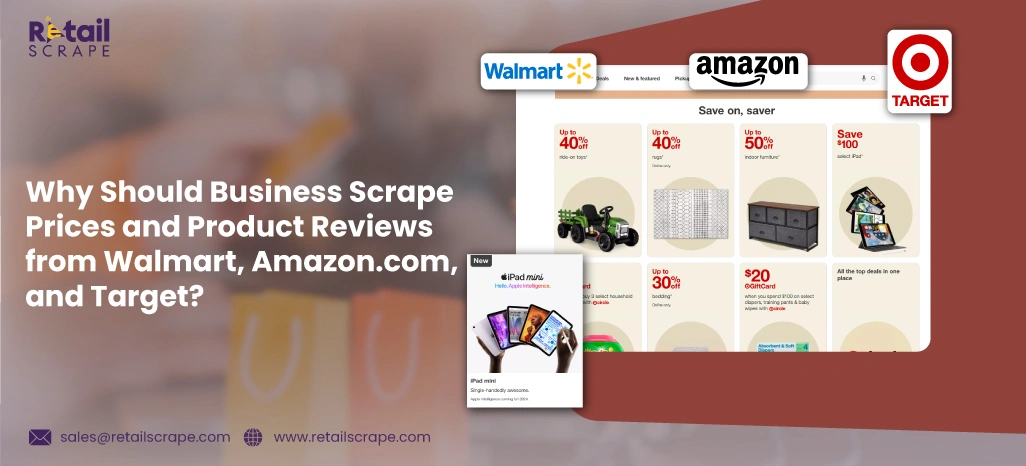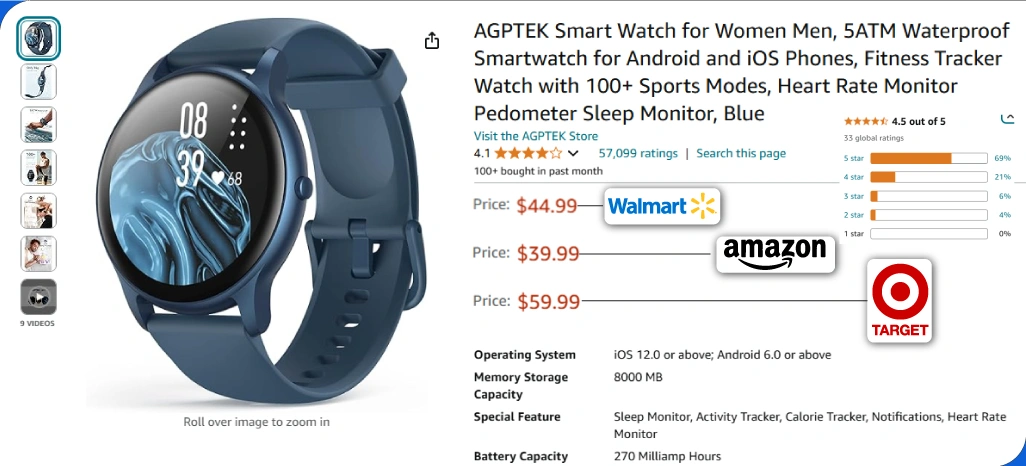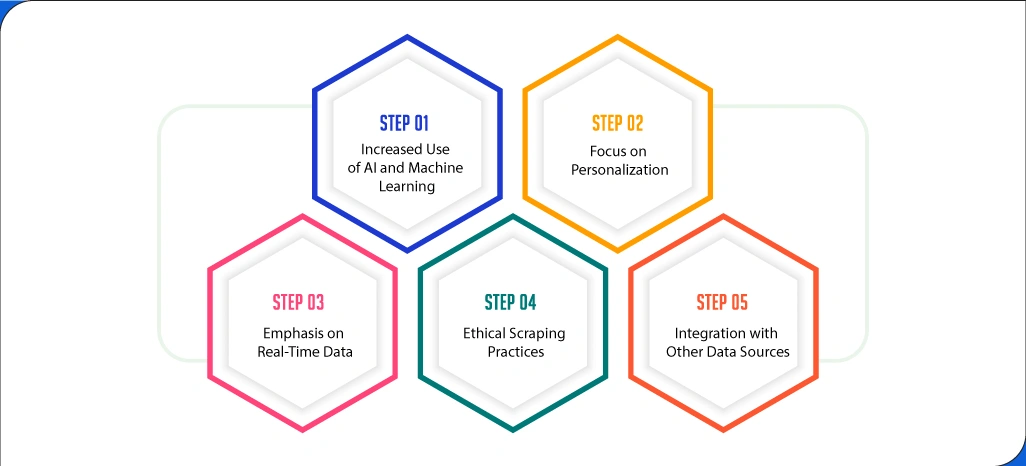Why Should Business Scrape Prices and Product Reviews from Walmart, Amazon.com, and Target?

The e-commerce landscape has significantly changed how consumers shop and how businesses formulate their marketing strategies. With industry leaders like Walmart, Amazon, and Target at the forefront, the enormous volumes of data generated on these platforms create unique business opportunities. By leveraging techniques to scrape prices and product reviews from Walmart, Amazon.com, and Target, companies can extract valuable insights that inform strategic decisions, enhance customer experiences, and strengthen their competitive position in the market. Ecommerce product review scraping enables businesses to understand customer sentiments, while the ability to scrape e-commerce prices helps them optimize pricing strategies based on market trends. This data-driven approach improves product offerings and allows businesses to stay ahead of the competition by responding quickly to changing consumer demands. Ultimately, using scraped data effectively can lead to increased sales and improved customer satisfaction.
The Importance of Price Scraping from Walmart, Amazon.com, and Target

- Competitive Analysis: In a market characterized by fierce competition, understanding how competitors price their products is crucial. Scraping prices from platforms like Walmart and Amazon enables businesses to benchmark their offerings against similar products. This allows companies to identify pricing strategies that work, adjust their prices accordingly, and ultimately remain competitive. For example, businesses can scrape product data from Target to gain insights into competitor pricing.
- Dynamic Pricing Strategies: E-commerce platforms often employ dynamic pricing, adjusting prices based on demand, time of day, or competitor pricing. By continuously scraping price data, businesses can stay updated on market trends and adapt their pricing strategies in real time. This agility can enhance sales performance and customer retention. Companies can extract prices from Amazon to fine-tune their dynamic pricing models.
- Market Demand Insights: Understanding pricing trends can help businesses gauge market demand for specific products. Companies can identify price fluctuations and correlate them with sales volume by analyzing scraped data over time. This insight is crucial for inventory management, production planning, and promotional strategies. Additionally, web scraping e-commerce data can track demand patterns and refine the offerings.
- Price Optimization: With accurate price data, businesses can implement advanced algorithms for price optimization. Machine learning models can analyze historical price data and consumer behavior to recommend optimal pricing that maximizes revenue while maintaining competitiveness. Utilizing e-commerce data extraction techniques, companies can continually refine their pricing strategies based on the most up-to-date information available. Furthermore, they can scrape product reviews from Walmart to understand customer sentiment related to pricing and product value, further enhancing their optimization efforts.
Extracting Product Reviews from Walmart, Amazon.com, and Target

In addition to price data, product reviews are a goldmine of information for e-commerce businesses. Scraping product reviews from platforms like Amazon, Walmart, and Target offers numerous advantages:
- Understanding Customer Sentiment: Product reviews provide direct insights into customer satisfaction and dissatisfaction. By scraping and analyzing these reviews, businesses can identify common themes and sentiments associated with their products or competitors' offerings. This understanding allows companies to enhance their products, improve customer service, and build stronger brand loyalty. Using an e-commerce data scraper can help automate the collection of this valuable feedback to inform business decisions.
- Identifying Product Strengths and Weaknesses: Reviews often highlight specific product features that customers appreciate or dislike. By analyzing this feedback, businesses can pinpoint areas for improvement in their product design or functionality. This information can guide product development and refinement efforts. Companies can utilize tools to collect e-commerce product reviews efficiently, ensuring they capture a broad spectrum of customer insights.
- Competitive Benchmarking: Scraping reviews from competitors' products allows businesses to gauge how their offerings stack up against others in the market. Understanding what customers value in competitors' products can inform marketing strategies and product enhancements. Insights gained through e-commerce datasets can be a benchmark for evaluating performance against industry standards.
- Enhancing Marketing Strategies: Positive reviews can be leveraged in marketing campaigns to build trust and credibility. By identifying the key aspects that lead to favorable reviews, companies can emphasize these features in their advertising, helping to attract new customers. Additionally, integrating e-commerce scraping API solutions can streamline the process of gathering and analyzing review data to bolster marketing efforts.
- Tracking Brand Reputation: Continuous monitoring of product reviews allows businesses to track their brand reputation over time. This vigilance enables companies to respond promptly to negative feedback and implement corrective actions to mitigate potential damage. Regular e-commerce price data collection and review scraping help maintain a comprehensive overview of brand perception, allowing for timely interventions based on customer sentiment. Furthermore, the ability to scrape e-commerce product details efficiently ensures that businesses have up-to-date information for informed decision-making.
Challenges in Scraping Data from Walmart, Amazon.com, and Target

While the benefits of scraping prices and product reviews are substantial, there are challenges that businesses must navigate:
- Legal and Ethical Considerations: Data scraping can raise legal and ethical concerns, especially when accessing a website's content without permission. Companies must ensure compliance with the websites' terms of service from which they are scraping data. Engaging in scraping practices that violate these terms could result in legal repercussions or being banned from the platform.
- Website Changes: E-commerce websites frequently update their layouts and structures, which can disrupt scraping processes. Businesses need to implement adaptable scraping solutions that can accommodate changes to website design and ensure the continued accuracy of data extraction.
- Data Quality and Relevance: The accuracy and relevance of scraped data are critical for making informed decisions. Businesses must invest in robust data cleaning and validation processes to ensure the reliability of the information extracted from product listings and reviews.
- Technical Challenges: Scraping data efficiently requires technical expertise. Companies may need to invest in specialized software or hire skilled developers to create and maintain scraping tools that can handle the volume of data generated by large e-commerce sites.
- Rate Limiting and IP Blocking: E-commerce websites may employ measures to prevent excessive scraping activity, such as rate limiting or IP blocking. Businesses must be mindful of these limitations and implement strategies to avoid being flagged as a bot, such as using rotating IP addresses or employing human-like browsing patterns.
Applications of Scraped Data

The insights derived from scraping prices and product reviews can be applied in various ways across different sectors:
- Retail Strategy Development: Retailers can utilize e-commerce data scraping to inform their pricing strategies, promotional campaigns, and inventory management practices. By understanding market trends, they can align their offerings with consumer demand and enhance sales performance. Utilizing pricing intelligence services allows retailers to adapt to competitive pricing quickly and effectively.
- Market Research: Analysts and researchers can leverage scraped data for comprehensive market analyses. This information can help identify emerging trends, consumer preferences, and competitive dynamics, enabling more informed strategic planning. The insights gained can drive decision-making processes in various sectors, ensuring businesses stay ahead.
- Consumer Behavior Analysis: Understanding how consumers interact with products and reviews can provide valuable insights for marketers. By analyzing review sentiments and purchase patterns through retail website data extraction, businesses can tailor their marketing messages to resonate with their target audience effectively. This targeted approach enhances marketing efficiency and customer engagement.
- Product Development: Companies can use insights gained from product reviews to inform their product development processes. By identifying gaps in the market or areas for improvement through effective product matching, businesses can create products that better meet consumer needs. This data-driven approach ensures that product offerings are aligned with customer expectations.
- Supply Chain Optimization: Data on pricing trends can assist businesses in optimizing their supply chain operations. By understanding market demand and pricing fluctuations, companies can make more informed procurement and inventory management decisions. Price optimization for retailers based on scraped data can significantly enhance profitability and operational efficiency.
Future Trends in E-commerce Data Scraping

As the e-commerce landscape continues to evolve, several trends are likely to shape the future of data scraping:
- Increased Use of AI and Machine Learning: Advanced technologies like AI and machine learning will play a more significant role in eCommerce scraping services and analysis. These technologies can enhance the efficiency and accuracy of scraping processes and enable more sophisticated analyses of consumer behavior and market trends, particularly in competitive pricing analysis.
- Focus on Personalization: As consumers increasingly expect personalized shopping experiences, businesses will leverage scraped data to understand individual preferences better. This insight can drive targeted marketing efforts and product recommendations, enhancing the effectiveness of price scraping strategies
- Emphasis on Real-Time Data: The demand for real-time data insights will continue to grow, prompting businesses to develop more agile data scraping solutions. Companies will increasingly seek to implement online retail price monitoring systems that provide instant access to pricing and review information.
- Ethical Scraping Practices: As awareness of data privacy issues rises, businesses must adopt more ethical scraping practices. This includes ensuring compliance with regulations and transparency about how scraped data is used, particularly in competitive pricing analysis.
- Integration with Other Data Sources Businesses will likely integrate scraped data with other sources of information, such as social media metrics and web analytics, to create a more comprehensive view of consumer behavior and market dynamics. This holistic approach will enhance the effectiveness of eCommerce scraping services and strategic decision-making processes.
Conclusion
Scraping prices and product reviews from e-commerce websites like Walmart, Amazon, and Target offers businesses a competitive edge in an increasingly crowded marketplace. By leveraging the insights from scraped data, companies can refine their pricing strategies, enhance customer experiences, and develop products that resonate with consumers. However, it is essential to carefully navigate the challenges associated with data scraping. With a strategic approach and a commitment to ethical practices, businesses can unlock the full potential of e-commerce data scraping, driving growth and innovation in their respective industries.
Transform your retail operations with Retail Scrape Company's data-driven solutions. Harness real-time data scraping to understand consumer behavior, fine-tune pricing strategies, and outpace competitors. Our services offer comprehensive pricing optimization and strategic decision support. Elevate your business today and unlock maximum profitability. Reach out to us now to revolutionize your retail operations!
